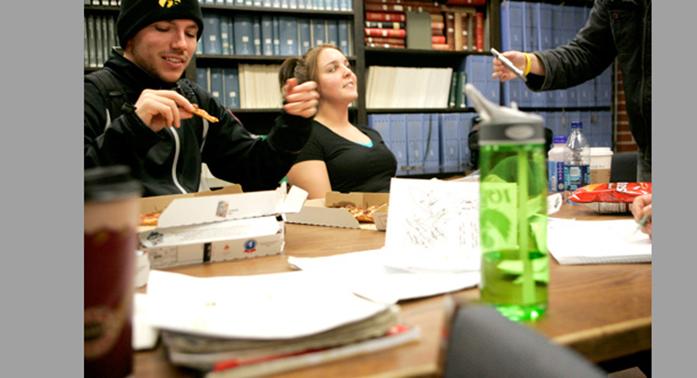The Green Room is a new Honors class at the University of Iowa taught by David Gould, which uses food, discussion, and creative guest speakers to get students more engaged in their education.
By Molly Hunter
A new class at the University of Iowa is using thoughtful discussion as a tool to inspire students to get engaged in their education.
The Green Room is taught by Belin-Blank Center administrator David Gould. The Honors course features thoughtful discussion, food, and a diverse set of guest speakers, which included on Sept. 14 a musician.
Robert Kirby, an associate director of the UI Honors Program, said the class structure is designed to get students more involved in their education.
“We are grabbing [people] out of high school and saying, ‘Find your career and make it a practical one,’ ” said Gould.
Gould said college education is often approached as a game of résumé-building in which the person who gets the best job is the winner. He and Kirby began meeting with Honors students last spring to get their input about how a different kind of class might look.
Though not in Honors, UI student Akash Bhalerao — who studies social entrepreneurship and environmental restoration through the program of the Interdepartmental Studies Program — was among those with whom Kirby and Gould met.
“A traditional thing is … structured classes; some classes are discussion-based, and they’re amazing, but … they don’t help you figure out why it is important in the context of your world and what you would like to do,” Bhalerao said.
The Green Room is different, Kirby said.
“The idea was how could we take a class and build it around … what matters to you and how can you think about what you’re doing here and apply that toward your future,” he said.
Over the summer, Gould reached out to several guest speakers for the class, many of whom were his friends.
“When the class started the very first night, I took all the people that I’d collected, and I put their quotes around the room here without their names, and then I had five chairs under each quote,” Gould said. “I told [them] to read every quote and to sit by the one that spoke to [them] the most.”
Based on whose quote they had chosen, each group was then assigned a guest speaker to work with and a class session that they would be responsible for organizing and leading. Because Gould believes that communities are formed when people eat together, students are also expected to provide food for the evening class.
Each guest speaker asks the class a question, which is designed to help give the period direction.
The question posed by magician Nate Staniforth, the Sept. 14 guest speaker, was “Where do you find wonder?”
The class is then encouraged to hold a dialogue with the speaker. Kirby said the speakers are asked about their lives during their college-age years — how were they shaped by the experiences they had and the ideas they encountered?
Gould said he believes this discussion is what sets this class apart from others.
“What usually happens is somebody says, ‘Do I have any questions?’ and [students] are sitting there,” he said. “What usually happens is they don’t take pictures. What usually happens is, if it’s a big enough class, they leave when they want, or they’re waiting until the clock strikes.”
Gould said this creates a misconception that college students are apathetic about their education. However, he said, he believes students simply crave inspiration.
“It is very essential to feel that your education is actually meaningful,” Bhalerao said. “I just wish…more students can get the benefit of this.”



